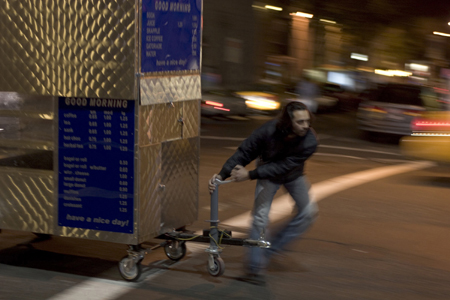|
Reviews of Recent Independent, Foreign, & Documentary Films in Theaters and DVD/Home Video
Edited, Written & Directed by: Ramin Bahrani. Produced by: Bahrani, Pradip Ghosh & Bedford T. Bentley III. Director of Photography: Michael Simmonds. Music by: Peyman Yazdanian. Released by: Films Philos. Language: English & Urdu with English subtitles. Country of Origin: USA. 87 min. Not Rated. With: Ahmad Razvi, Leticia Dolera & Charles Daniel Sandoval.
This film’s title is as strikingly simple and encapsulating as the movie itself,
which is loosely based on the experiences of Ahmad Razvi, making an impressive acting debut. Ahmad, a Pakistani immigrant to the
United States, left behind his life as a rock star in his native country in search of opportunity for his family.
A decade later, he is now a widower and separated from his son by his estranged in-laws, who hold Ahmad responsible for their
daughter’s death.
The film observes the minutiae of Ahmad’s current incarnation as a coffee cart vendor, while depicting a specific stratum
of ethnic minorities in this era of globalization. Indeed, though set in post-9/11 New York City, it is universal tale, a fact
reinforced by the immediacy of its hand-held camera, its understated acknowledgment of the bias Muslims face, its enigmatic dialogue,
and the emphasis on its characters’ internalized psychology.
Though director Ramin Bahrani cites Iranian filmmaker Abbas Kiarostami as an influence, Italian neorealism is also apparent.
From the film’s beginning, with vendors pushing carts out of storage early in the morning, to the realization that its two most
heartwrenching moments are relatively ordinary events (the death of a kitten and the disappearance of a cart), the movie evokes
director Vittorio De Sica’s penchant for conveying the despair of how “the other half” lives via scenes centered on the most mundane circumstances (and owing quite a bit to De Sica’s classic The Bicycle Thief and Umberto D). While the writing is sharp, if at times over-explanatory, Bahrani lets significant sequences play out silently. This, and the vagueness of Ahmad’s wife’s death, contributes to the protagonist’s alienation, making him an existential Everyman.
In the end, one feels the real tragedy of immigrants in the modern age is that they may not have actually wanted to leave home, but had to because of economic considerations, and so find themselves – as the film subtly implies – without a sense of identity. Or, as Ahmad tells Noemi, a friend and possible romantic interest (the excellent Leticia Dolera): no matter who he was before, he now regards himself as “just a Pakistani guy…selling coffee and donuts.”
Reymond Levy
|

